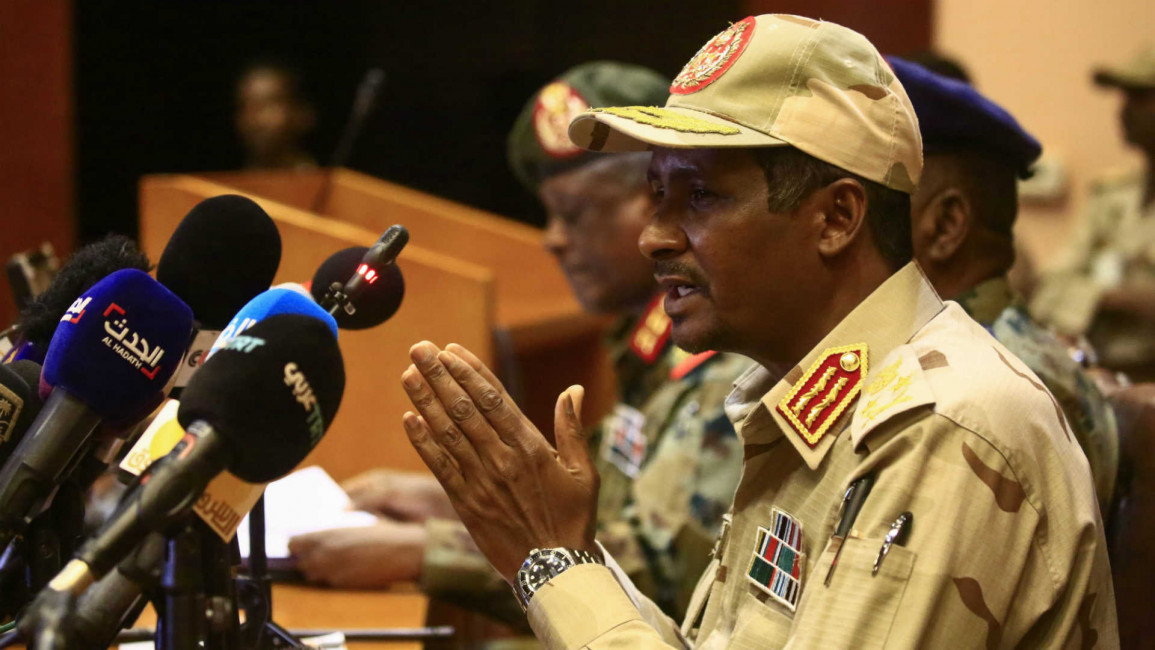Sudan military council generals slip up in two press conferences in one day
Generals in Sudan's ruling transitional military council have made two critical verbal slip-ups in the space of 24 hours that have left anti-regime protesters feeling their suspicions about the military junta's motives of power are correct.
Sudan's military seized power in a coup earlier in April after months of mass popular protests across the country.
Although the governing transitional military council has agreed to the formation of a joint civilian-military transitional council with negotiators representing the demands of protesters, many Sudanese on the streets remain suspicious of the military council, members of which they see as enduring remnants of Sudan's previous regime.
Protesters' demands have led to the resignation of former security forces chief Salah Gosh and three members of the transitional council who were seen as close allies Bashir representative of rights abuses and war crimes allegedly carried out under his tenure.
Despite demonstrators calling for the arrest of such regime remnants, many remain free - including Gosh, who as National Intelligence and Security Service (NISS) chief earned the enmity of anti-regime Sudanese.
Protesters have also demanded to see Bashir and other regime figures who the military says have been imprisoned, but their demands have gone unheeded.
This lack of transparency, coupled with actions by the military such as its demand for protesters to remove barricades protecting a mass sit-in in the capital Khartoum, have only served to deepen worries that the military is trying to seek power for itself, rather than secure a civil democratic state that protesters are demanding.
Two embarrassing verbal slip-ups by members of the transitional military council over the past 24 hours have strengthened those concerns.
At a televised press conference on Monday night, council spokesman Shams al-Deen Kabashi called the protest organiser-led umbrella group tasked with negotiating with the military "the Alliance for Freedom and Assassination" ("ightiyal" in Arabic).
The real name of the group is the Alliance for Freedom and Change ("taghyir" in Arabic).
A more spectacular blunder was to come on Tuesday.
Sitting in front of press mics at another televised press conference on Tuesday, council member General Salah Abdel Khaliq appeared not to realise the mics were on when he unfavourably compared himself to the council's deputy leader, Mohammad Hamdan Daglo.
Daglo, widely known by his nickname Himedti, is the chief of Sudan's Rapid Support Forces (RSF).
The paramilitary anti-insurgency force is a direct descendant of the Janjaweed militias of the Darfur conflict, of which Himedti is also said to have been a commander.
The Sudanese regime is alleged to have recruited, funded and armed the Janjaweed who committed mass rape, murder, war crimes and genocide in West Darfur and other regions, according to the International Criminal Court (ICC).
Under Himedti, the RSF has fought against rebel groups in the conflict areas of Darfur, Blue Nile and South Kordofan, but it has also been accused of crimes and human rights violations against civilians in those areas.
The RSF has also been responsible for rounding up and deporting refugees and migrants, most of whom are Somalis, Eritreans and Ethiopians, attempting to cross the desert to reach Europe.
Many protesters term Himedti a "war criminal" and see his position as deputy leader as evidence that the military does not intend to seriously reform the Sudanese regime.
Rather than distancing himself from Himedti, Abdel Khaliq seemed to say that the deputy leader was "bad".
"I swear to God, I'm worse than Himedti," the naval commander said. "People just don't know."



